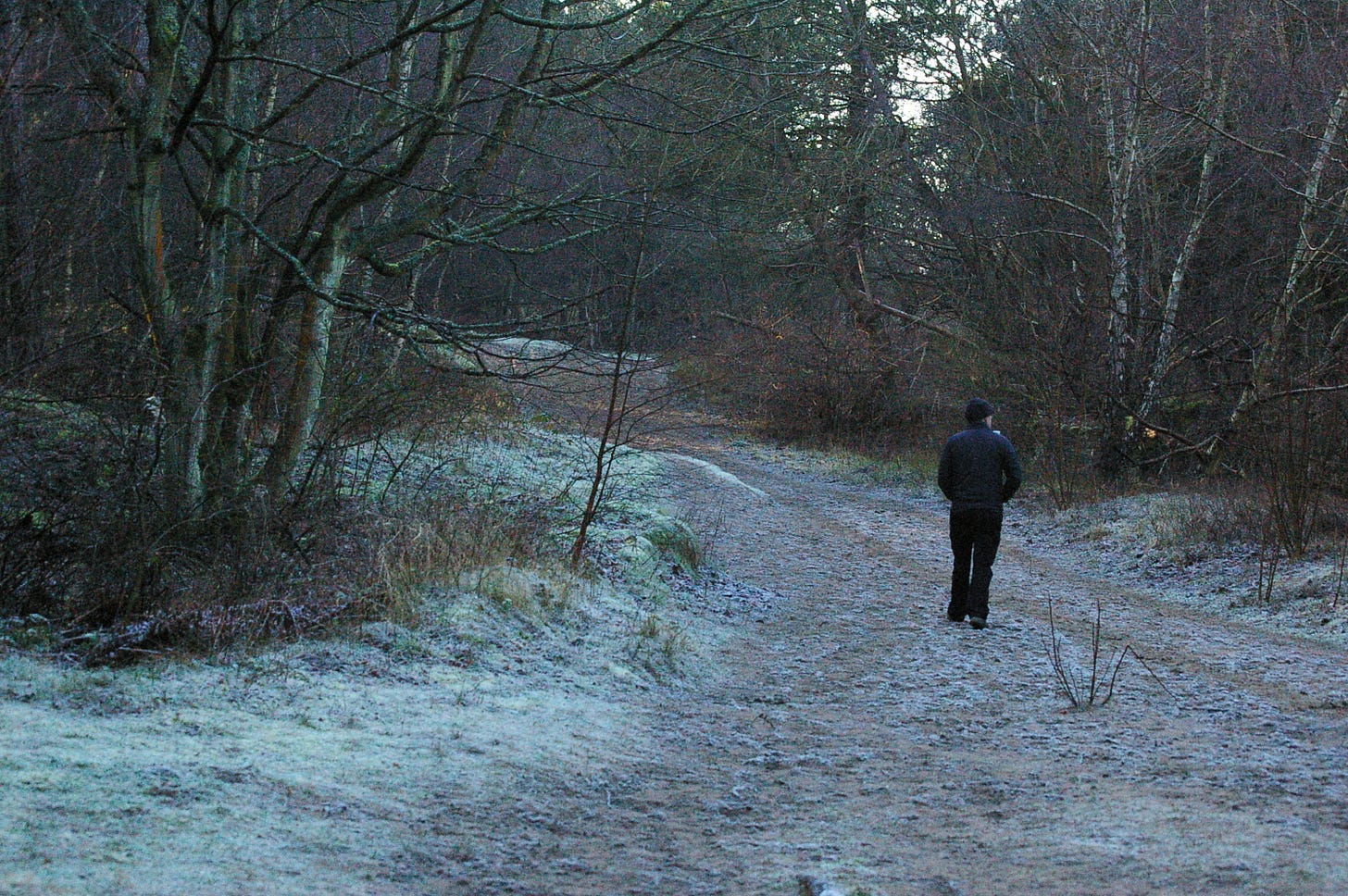The Question Concerning "Vaccine" Technology.
There is no starting again. There is no once and for all. Part I: The Question.
“We shall be questioning concerning technology. Questioning builds a Way…. the Way is a way of thinking.”
The title of this piece comes from an uncannily prescient essay written by German philosopher, Martin Heidegger (1889-1976), entitled The Question Concerning Technology which he wrote and developed after WWII. Heidegger’s branch of philosophy (if we can call it that) was phenomenology which is concerned with careful description of the human experience rather than matters of logic and deduction.
For those who are aware of the trajectory of Heidegger’s life and works, it may seem strange to bring something of his work to bear upon a situation that is looking decidedly more “Nazi” as each day unfolds. For those who are not familiar, Heidegger, whilst being one of the most important of twentieth century continental philosophers was nevertheless, a member of the Nazi party during WWII. This matter has been endlessly debated and discussed and it is, in a very real sense, a highly complex and unresolvable aspect of the man’s life. I don’t intend to enter into those debates here, merely to acknowledge their existence. It has become my view that despite the inherent paradox, perhaps he, (and that essay in particular) are precisely the things we need to learn from right now. (For more on this unsettling aspect, I recommend George Steiner’s book Martin Heidegger, University of Chicago Press, 1987).
The question concerning vaccine technology forms part of my thinking about the current drive to penetrate every human on earth (bar the self-appointed elites) with a genetically modifying technology for reasons as yet unclear. Yet I am as certain as I can be that whatever the reasons, they are unconnected to the flourishing of human health.
In what follows, I am not concerned with the mechanics of vaccine technology. That is to say, how vaccines supposedly “work” to immunise people (or not as the case may be) nor a consideration of ingredients, nor even the new messenger ribonucleic acid technology, known as mRNA. My concern is the overarching aspect of how technology has penetrated our lives and moreover, our ways of thinking about ourselves and our existence.
Before I elaborate further, I would wish to draw the reader’s attention to Heidegger’s words regarding building a way or a pathway from thinking. There seems to have been a dearth of thinking going on right across the board recently. Furthermore, it seems to me that this is by design. The stoking of fear is known to cause panic and this results in a freezing of the ability to think. I sense the injected are experiencing buyer’s remorse and so cannot bear to think beyond what they feel they can cope with. Additionally, the mafia elites dare not think about what it is they are knowingly doing. To find themselves in the dock, guilty of another Shoah, or Holocaust is literally, for them, unthinkable. They cannot think it. They will stop themselves from thinking in order to be able to continue with their quests. And that is where we are at right now it seems to me.
The situation is so serious, I can never seem to find words strong enough to wake people up out of what appears to be a vacuous stupor. It is the darkest thing to find the answer to a question that has hovered in my mind for many years. That question being, in the 1930s and 40s, how could some of the most cultured, intelligent of Europeans have been so easily fooled by (what we now know to have been) a nasty little man like Hitler? And yes, I guess that includes Heidegger and many other academics. It seems that now I can see exactly how this could have happened. I feel the same question coming to the fore over my own countrymen, friends, family and neighbours, of all faiths and none. How can they not see that another Holocaust is unfolding before them in full technicolour and in plain sight? We have now discovered what the average 1930s German perceived. Nobody and everybody knows what is going on. It is all around us now.
The crux of the situation seems to be the idea of conforming and sacrificing for some “greater good” and getting behind whatever tyranny is being developed because of a “good cause.” There is an underestimation of how ordinary Germans functioned from 1933 onwards and how long the mission creep was before the mass murders came into full swing. Intense propaganda and draconian censorship played their part then as they do now. The parallels with current events are, as the Germans might say, unheimlich.
One of the aspects that made the 1940s Holocaust so chilling was the use of modern technology and the efficient deployment of it. The lethal combination of modern technological advancement, bureaucratic systems and a will to power made modern mass killing a reality. I have heard it said that the killing machine of Auschwitz (used here as a collective umbrella term for the entire process) was a “discovered possibility” rather than a well laid out plan. Is that the case today? Was the emergence (by whatever means) of the infamous coronavirus a gateway to another discovered possibility? That of re-training of formerly free peoples into a highly constrained, controlled way of being, with all rights of speech and freedom curtailed and contingent upon the whims of self-appointed elites? Not to mention the wilful destruction of many innocent people, including children.
In today’s world, the elites barely hide what they are doing. Their arrogance is breath-taking in its confidence. As a result, and I harbour no doubt about this, those who cooperate are colluding with murder. And, like the German people who claimed ignorance in times past, they can no longer say they didn’t know or that nobody told them.
Questioning Builds a Way.
For questioning to build a way, or a path-way, consider the physical nature of a pathway. Heidegger was known for his walks in the Black Forest and often used terminology that reflected this. Walking is a great pastime for thinking. As a person steps into the track that has already been trodden, he adds his foot prints to those of others. So it is with thought, thinking and intellectual activity. One adds one’s thoughts and builds one’s own discoveries upon the footsteps of those who have gone before. There is nothing that one can invent solely from scratch. The pathway becomes more defined the more people tread their way. And such a pathway will subsequently reflect something of what works or even what is true. So it is with asking questions. Questioning builds a way, or a pathway. With thinking, as in pretty much every human activity, there is no starting again, there is no once and for all.
Heidegger had become concerned about the impact of technology upon the human. It is not that he was “against” technology. Technology is after all pretty much anything humans use as a tool. The pen, the desk and the chair can all be understood as “technology.” We understand the hammer, not by knowing its properties but by picking it up to hammer in nails. You pick up your pen to write. You don’t think about every particular quality of the pen or how it works each time you use it. Your relationship with the pen is established through your using it. You inhabit a world in which hammers and pens are meaningful. This is your engagement with the world. You are not separate from the world; you are a part of it. You are attuned. The hammer is technology. The pen is technology.
However, there is a tangible difference between a handmade and local technology where you know the person who built your fence, or made the ceramic jug you use; and the mass-produced anonymous world of imported goods. For all their travelling around the world these imported goods bring us no closer to their origins.
“We ask the question concerning technology when we ask what it is.”
Technology, which just seems to “be there” is not neutral; it is fully stitched into our human lives. Technology alters the way we understand the world and ourselves. I suggest that we no longer see and experience life as we once did. Life is increasingly a mediated experience. Furthermore, we frequently contract out our experiences and enjoy the ensuing convenience. In this way we are increasingly dislocated from life’s tangibility.
Technology should work for man; man should not be subservient to technology. Yet we are racing towards that second conception at breakneck speed it seems to me. The frequent citing of Yuval Noah Ha-rari’s words about how the world does not need so many people suggests that his grasp of what it means to be human has passed beyond an acceptable threshold and is now approaching the murderous. That he paraphrases the Nazi slogan about “useless feeders” is galling. Given his own ethnic background, regardless of any eschewing of God, his chances of surviving the then 1930s-40s onslaught from those he would cite so easily would have been minimal to say the least. Ha-rari has been sickeningly instrumental in revealing the WEF Fourth Reich’s intentions towards humanity, and its singularly callous attitude to the human individual. (I refer here to Schwab’s so called Fourth Industrial Revolution. What is it if not intended as a Fourth Reich?)
Adolf Eichmann famously excused his murderous actions as emanating from the requirement to obey orders. In reality, he stopped himself from thinking in order to carry out those heinous orders. As it is today with the distancing afforded by technology, the WEF advocates never have to come face to face with the human beings they hope to eliminate. The distancing afforded via technology makes the very thought of what it means to be human something remote and destructible. It makes the possibility of actual destruction all the more closer and achievable.
Technology is not just about stuff that helps us get things done, it is a way of understanding the world. Our dependence upon certain technologies whether directly or indirectly via others, shapes our lives and affects our perceptions of life. Before we can grasp what is happening, technology develops beyond human control. We see this through our addiction to the mobile phone, that little pocket computer the use of which we know is fraught with danger.
Technology is the “highest danger” when we see the world through technological thinking.
Heidegger is asking us to think about our relationship with technology, and our relationship to Being or existence. This is not about us as “beings,” although of course, we are beings. It is about our existence, and what it means to “be” in the world. This is what Heidegger is talking about. What is the meaning of existence? Why is there something rather than nothing? I cannot help feeling that this question is particularly pertinent to those who eschew any spiritual or religious basis to life (for example, Ha-rari). If that way of thinking is correct, why does anything exist at all?
Yuval Noah Ha-rari in his WEF world, reveals technology as the will to mastery. It is true that technology has released us from drudgery. But at what point do we lose touch with the realness of things because we simply no longer handle things for ourselves? This “no longer handling things” and the ubiquity of mediated experiences have left us ripe for the exploitation heaped upon us by our own governments. Even now, with all that has been revealed, we continue to struggle with the question concerning vaccine technology.
The question concerning vaccine technology is about the gateway effect it now seems to have above and beyond the previously known. The typical vaccine as we have always been led to believe, provides sterilising immunity to a harmful pathogen. We now know that this is not the case for the mRNA injections which are neither safe nor effective for a substantial proportion of the population. Death rates are up some 14-16% in countries which have pushed the so-called vaccines. Medics are said to be “baffled” by the figures and are struggling to explain them. Like a perverse pantomime, we cry out ”it’s behind you!” whilst the medics rush around the stage pointedly avoiding the answer and looking away. This is clown world.
We have no data for any of the long-term effects of the injections as readers of this account will surely be aware. And technology all around us is harnessed to belittle, insult, threaten, cajole, persuade and terrify us into submission. Technology is used to censor, to cancel, to remove livelihoods, banking facilities and on it goes. The question concerning vaccine technology is really about that gateway. Many have said that when you understand that the “virus” was created for the vaccine, and the vaccine was created for the passport, and the passport was created for, well, what exactly?
Hubert Dreyfus writes, “It is not so much the destruction of nature or culture, but certain totalizing kinds of practices… This threat is not a problem for which we must find a solution, but an ontological condition that requires a transformation of our understanding of being.” (Heidegger on the Connection between Nihilism, Art, Technology, and Politics)
In treating nature as a resource to be harvested and used, and the ever-increasing efficiency of our “systems” brings the danger that human beings are reduced to merely a “resource.” Think of all those old fashioned “personnel” departments that have been rebranded as “human resources.” Dreyfus explains that as all aspects of life become flattened in the attempt to equalise everything, we see that in politics, religion and social activities there are fewer meaningful differences. This, I would conclude, suggests that the drive for equality (one of the active concerns of the typical HR department) results in a totalising effect. We, and the activities we undertake, matter and mean less and less. We are no more than our instrumental value or basic usefulness. And it is this way of non-thinking that prompts the Ha-raris and the Schwabs of this world in their quest to “deal with” the useless eaters cluttering up the “planet.”
Hubert Dreyfus cites HAL in the film 2001. When asked if he is happy on the mission he says: “I’m using all my capacities to the maximum. What more could a rational entity want?” This, says Dreyfus, is an expression of our current understanding of being.
George Steiner discusses the proposition that Heidegger’s thoughts on technology were prophetic. He cites Jean Francois Lyotard’s observations of the Nazi extermination programme, the Soviet Gulags and Nuclear armaments which can be seen as manifestations of humanity’s “forgetting of being.” Arguably, Heidegger like many of his fellow academics and citizens had no real idea what was to unfold as the 1930s went on. Steiner, outlining some thoughts about Heidegger’s nihilistic observations about technology suggests that it was not so much that Heidegger was wrong, rather, “Heidegger had been too right.”
In the next part of this account, I look back upon another set of experiences I had exploring Heidegger’s discussion of technology at the Another Place art installation on the Sefton Coast near Liverpool.
As always, comments are welcome. Pictures by The Sideways Thinker.







This is a brilliant essay. Harari's words, which you cite, show what happens when we no longer have a common goal; common sense. The natural question to ask is what is the system he is talking about, who owns that system and what is the goal of the system. I suspect the goal is not so much money and power; rather it is an ideal, but it is an ideal that is grounded in a loss of sense of reality; it is grounded in madness.
Thanks for this. I increasingly understand why my book The Virtuous Cyborg, published in 2018, fell on deaf ears.